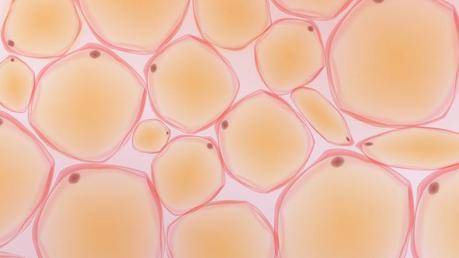
Guess which diet leads to better insulin action and smaller fat cells?
That's right: a very low-carbohydrate diet.
A new randomized control study of overweight individuals has found that, compared to a low-fat diet of the same number of calories, the low-carb diet is more effective at reducing fat-cell size and improving insulin resistance, even if the weight loss is exactly the same.
That's what Dr. Tracey McLaughlin, of the Stanford Diabetes Research Center, told more than 500 participants at a recent World Congress on Insulin Resistance, Diabetes and Cardiovascular Disease.
"Fat-cell size appears to be an even stronger predictor of insulin resistance than obesity. [In the study] the more weight you lost, the more insulin action improved, but the more your fat-cell size shrank, the more your insulin action improved," said Dr. McLaughlin, whose presentation was one of the opening sessions at the influential congress, held Dec 4-7 in Los Angeles.
While both low-carb and low-fat diets caused equal weight loss, the low-carb diet caused greater fat-cell shrinkage and reduced circulating insulin levels.
"You can lose weight, but if you're having a lot of carbs and your insulin is sky high, maybe your fat cells aren't shrinking as much, " said Dr. McLaughlin, a professor of medicine, endocrinology, gerontology and metabolism at Stanford University.
Dr. McLaughlin's presentation to the congress was the focus of a special article.
Healio: Despite similar weight loss, low-carbohydrate diet deliver insulin reductions, smaller fat cells than low-fatDr. McLaughlin and her colleagues looked at a subset of participants from the famous DIETFITS randomized controlled study. That larger study compared healthy low-fat and low-carb diets of the same amount of calories to see which resulted in the most weight loss. Both diets removed sugar, refined grains, and highly processed foods, focusing on whole, unprocessed foods. In widespread coverage in medical journals and popular media, the initial results in 2018 found that the weight loss was the same.
But digging deeper, maybe there was a difference after all. According to the conference write up, McLaughlin and her colleagues obtained biopsies of fat cells from 40 overweight individuals in the study, randomized to either the low-fat diet or the low-carbohydrate diet. The biopsies were taken at the start of the diets and then six months later. Insulin levels were also tracked.
At six months, the low-carb diet group had significantly lower circulating insulin levels, under 50 µU/mL, and a reduction in fat-cell size. The low-fat group had insulin levels that peaked above 350 µU/mL and no discernible change in fat-cell size.
"It's pretty clear that when you have a lot of smaller fat cells, your metabolic health is tremendously improved," said McLauglin. However, she told the conference the results were preliminary and more research is needed to determine whether smaller fat cells translate into other significant health benefits from low-carb.
Also speaking at the conference, Dr. Sarah Hallberg, of Virta Health, stressed a ketogenic diet with proper medical support reverses diabetes, improves cardiovascular risk factors and is a "viable patient choice" for type 2 diabetes treatment.
At a session focused on "Medical Diets" Dr. Hallberg shared Virta Health's results in supporting patients with type 2 diabetes doing a low-carb ketogenic diet. She noted that at two years, 91% of participants had reduced or eliminated insulin use, with 55% in remission from their diabetes. Other important health markers improved, too, she noted, such as risk-factor scores for cardiovascular disease, liver-fat scores, and triglyceride levels.
Hallberg's presentation was also featured in a special write up about the conference.
Healio: Ketogenic diet 'viable patient choice' for type 2 diabetes"You have a patient who has tried everything, and they are injecting hundreds of units a day of insulin, and you can make a difference like this in the first couple of weeks," said Dr. Hallberg who is also founder and medical director of the Indiana University - Arnett Health Medical Weight Loss Program in Lafayette.
Diet Doctor has written about Virta's one and two year results. We have also covered Virta's findings for liver health markers and cardiovascular disease.
Hallberg and McLauglin were among more than 80 speakers at the four-day conference, which brings together family physicians, specialists, health researchers, nurses, dietitians, nurse practitioners and physician assistants to hear the latest research developments and treatments for insulin resistance, diabetes and metabolic disease.
While much of the four-day congress focused on new drug therapies and the traditional methods of managing diabetes and heart disease with medications, it is reassuring to know that the impact of a low-carb keto diet is starting to get some airtime during important presentations at international conferences.

